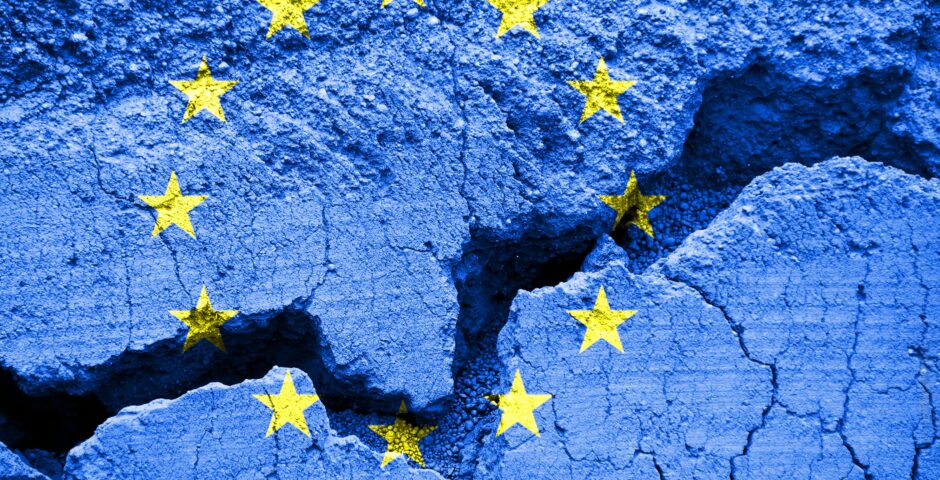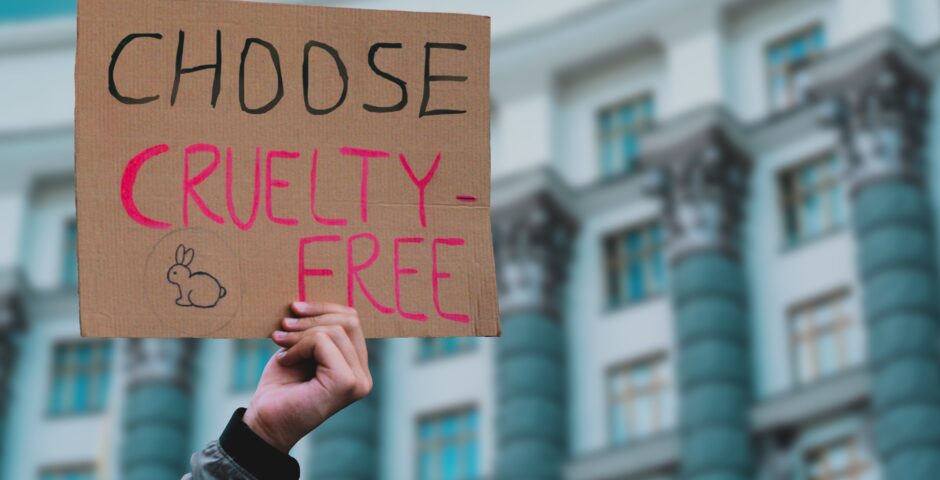Profile of EU member Cyprus: A Political Puzzle
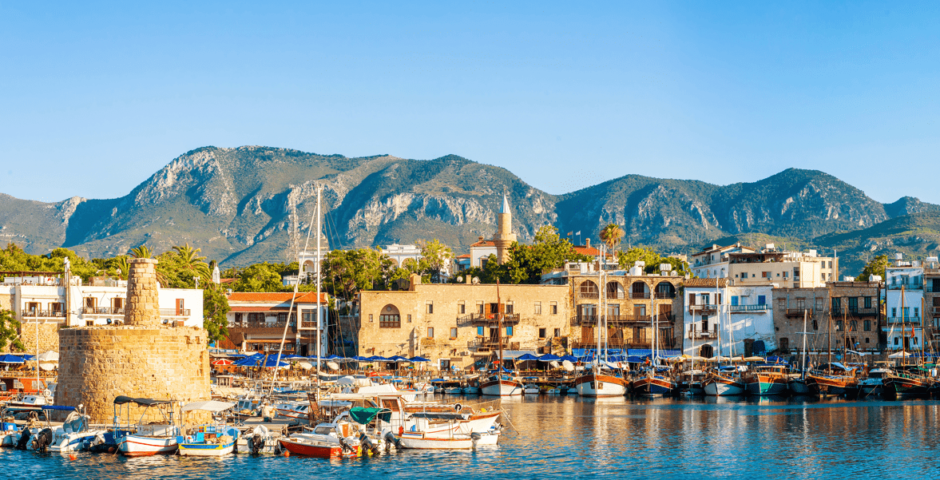
Cyprus: a divided country.
Cyprus is an island geographically located in Asia but considered part of Europe due to its political and cultural affiliations and history. According to Greek mythology, it is the birthplace of the goddess Aphrodite, and Nicosia is its capital. The island is home to just under one and a half million people within an area of 9,251 square kilometers, spread across nine islands. The majority of the population adheres to the Orthodox Church of Cyprus. The sun shines approximately 320 days per year, and there is no shortage of cats and goats. Throughout the millennia, Cyprus has been in many different hands, and it remains divided into two parts after the last few decades.
A Rich History
Cyprus holds a strategically advantageous position at the crossroads of Europe, Asia, and Africa. While culturally classified as European, geographically it is an Asian island. The fact that its land is rich in resources has made it a coveted territory. As early as 3000 – 2300 BCE, copper was extracted from the ground by inhabitants, and much of the copper circulating in Europe during that time originated from Cyprus. During the Roman era, Cyprus was even the world’s largest producer of copper. The name “copper” possibly derives from this; “copper” comes from the Latin word “cuprum,” which in turn is an abbreviation of “aes cyprium“, meaning “ore from Cyprus.” The first script originating in Cyprus, the Cypro-Minoan script, remains undeciphered to this day.
From 560 BCE to 545 BCE, the Egyptian empire held power over the island and its mighty fleet. Afterwards, Cyprus fell into the hands of the Persian Empire until Alexander the Great expelled the Persians from the island. Subsequently, the island was ruled by the Romans, Byzantines, Arabs, the Order of Knights Templars, Venetians, Ottoman Turks, and the British. It has a remarkably diverse and fascinating history that unfolded at the intersection of different continents.
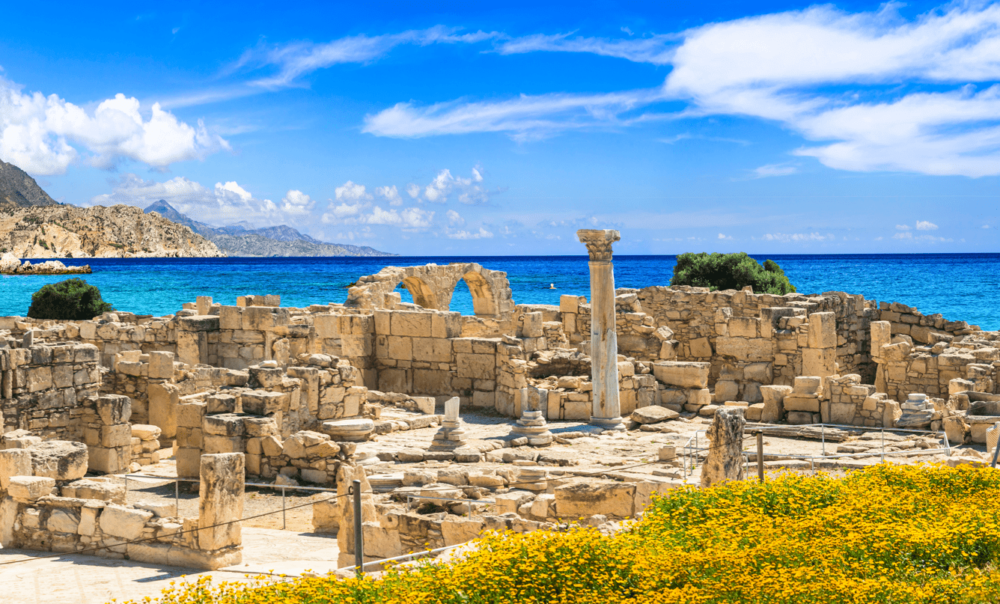
Ruins of a temple dedicated to Apollo Hylates in Kourion
Division
In 1974, the northern part of the island was occupied by Türkiye (previously known as Turkey). Since 1983, this part has been declared the Turkish Republic of Northern Cyprus (TRNC). However, the independence of Northern Cyprus is only recognized by Türkiye. To understand why Türkiye occupied this part of the island, we must go back to the period when Cyprus was still a crown colony of Great Britain. Cyprus was under British administration since 1878 and officially became a British colony in 1925. During the decolonization, the Greek community living in Cyprus demanded independence, and a majority of the Greek Cypriots advocated for Cyprus to join Greece. This movement is also called enosis (Greek for ‘union’). However, this call was not well received by the Turkish Cypriots living on the island; they did not want to live as a Turkish minority in a Greek state. Hence, they advocated for taksim; the division of the island into two areas. This view was supported by Türkiye.
In the following years, heavy fighting ensued. The EOKA (Ethniki Organosis Kyprion Agoniston; National Organization of Cypriot Fighters), founded in 1954 to fight for an independent Cyprus or enosis, conducted a violent campaign against the British, Turkish Cypriots, and Greek opponents of enosis. The bloody period that followed particularly victimized the Turkish Cypriots. In response, they formed their armed militia known as ‘Volkan’ or ‘TMT’. In 1960, the Republic of Cyprus became independent after negotiations between Turkey, the United Kingdom, and Greece. Unfortunately, peace did not return. Tensions between the two communities escalated after independence, leading to a civil war between 1963 and 1967.
After a coup by Greek Cypriot enosis supporters – backed by Greece – Türkiye invaded Cyprus in 1974. They occupied the northern part of the island and the city of Famagusta; approximately one-third of the island. Greek Cypriots from this region subsequently fled to the southern part of the island. The consequences are still evident; there is both a social and economic, as well as a political division. In 1983, the TNRC was declared. It is recognized only by Türkiye. There is still a Turkish military presence in Northern Cyprus. A resolution by the United Nations Security Council declared the independence unlawful in the same year. Bangladesh and Pakistan recognized the TNRC for a while but withdrew their support under international pressure. Northern Cyprus is internationally recognized as the territory of the Republic of Cyprus that Türkiye occupies. The capital, Nicosia, is also divided in two. In the middle lies a demilitarized zone (DMZ) maintained by the UN since 1974. This makes Nicosia the last divided capital in the world.

The city Nicosia
Political situation
The Republic of Cyprus is a presidential republic. The official languages are Greek and Turkish. The president, who serves as both head of state and head of government, is elected every five years. Since February 28, 2023, this position has been held by former Minister of Foreign Affairs Nikos Christodoulides. He independently participated in the presidential elections and was the first candidate to win the elections without a party. Cyprus has a unicameral parliament, known as the House of Representatives. According to the constitution, the parliament consists of fifty members, but this number was increased by law to eighty in 1985. The 24 seats reserved for Turkish Cypriots are vacant, as Turkish Cypriots have not participated in the elections since 1963. The remaining 56 seats are filled by Greek Cypriots.
There are eight parties in the parliament. The two largest parties are DISY (Dimokratikós Sinayermós; Democratic Rally) and AKEL (Anorthotikó Kómma Ergazómenou Laoú; Progressive Party of Working People). DISY is a conservative-liberal party affiliated with the European Christian Democrats. AKEL is communist and affiliated with the European United Left/Nordic Green Left. Since Cyprus joined the EU, DISY has won every election for the European Parliament (EP). In 2019, AKEL obtained the same number of seats as DISY but received fewer votes with 26.98% compared to DISY’s 35.65%. Cypriot politician Stella Kyriakides serves as the European Commissioner for Health.
The official language of the TRNC is Turkish. It is a semi-presidential republic, where the president also serves as the chair of the parliament. The prime minister heads the government, and there is a multi-party system. The TRNC annually receives approximately six hundred million dollars in aid from Türkiye. Since 2004, the Turkish Cypriot community has had observer status within the Parliamentary Assembly of the Council of Europe as part of the Cypriot delegation. It is not a recognized country. The Council of Europe is not part of the EU and focuses on promoting human rights and democracy.
Until 2004, Turkish Cypriots could not vote in the Republic of Cyprus. This changed with a ruling by the European Court of Human Rights, which deemed the denial of voting rights to Ibrahim Aziz – a Turkish Cypriot resident – unjust. However, it remains impossible for Turkish Cypriots to participate in the elections, and Turkish Cypriots residing in Northern Cyprus cannot vote, despite being official citizens of the Republic of Cyprus.
Accession to the European Union
On July 3, 1990, the Republic of Cyprus submitted its application for membership in the European Union (EU) and began the accession process. However, there was a contentious issue: they indicated that they were applying on behalf of the entire island, but the Turkish Cypriots disagreed. They argued that the Greek Cypriot administration did not represent the Turkish part. According to the EU, however, this was indeed the case; they recognized the claim of the Republic of Cyprus and the legitimacy of the Greek Cypriot government over the entire island.
The fact that there was little knowledge and interest within the EU regarding the conflict in Cyprus played a role. At the time, attention was primarily paid to developments in (former) communist Eastern Europe. EU member Greece was the one who put the island’s accession on the agenda. Greece had been supporting the Greek Cypriot government since the beginning of the conflict and hoped that accession to the EU would lead to the end of this conflict – in favor of the Greek Cypriots. The EU shared this sentiment, resolving the conflict a condition for accession. However, this has not happened to this day. Despite this, Cyprus officially joined the EU in 2004 as it met all the Copenhagen criteria.
The conflict still plays a role, but now in the accession process of Türkiye. The EU stipulates that a resolution of the Cypriot conflict is necessary for any potential accession. On the other hand, Türkiye’s prime minister Erdogan stated that the country would not participate in EU accession negotiations as long as the EU does not recognize the TRNC. This would be because the issue is still of great national importance. But why can the situation in Cyprus be considered a national interest for Turkey? The kinship between Türkiye and the Turkish Cypriot communities can partly explain this. However, other interests also play a role.
One of those interests concerns not the division on the island itself, but the seabed around it. An Exclusive Economic Zone (EEZ) is a strip up to 370 kilometers off the coast of a country within which the country has certain rights, such as the right to exploit resources in the seabed. Large gas fields were discovered under the seabed of Cyprus, as was announced in 2011. According to the UN Law of the Sea Convention, the waters around Cyprus are divided into zones of Greece, Türkiye, and the Republic of Cyprus. The TRNC disagrees with this; it believes that it can also claim a part of the waters and, therefore, the gas fields. The EU also welcomed the news, as it could become more independent from Russian gas and polluting energy sources such as coal. Türkiye has since begun drilling around the island. The Republic of Cyprus has done the same, with the EU’s support. Tensions have risen again as a result. The EU has imposed sanctions on Türkiye for drilling in the Cypriot zone but with little effect.
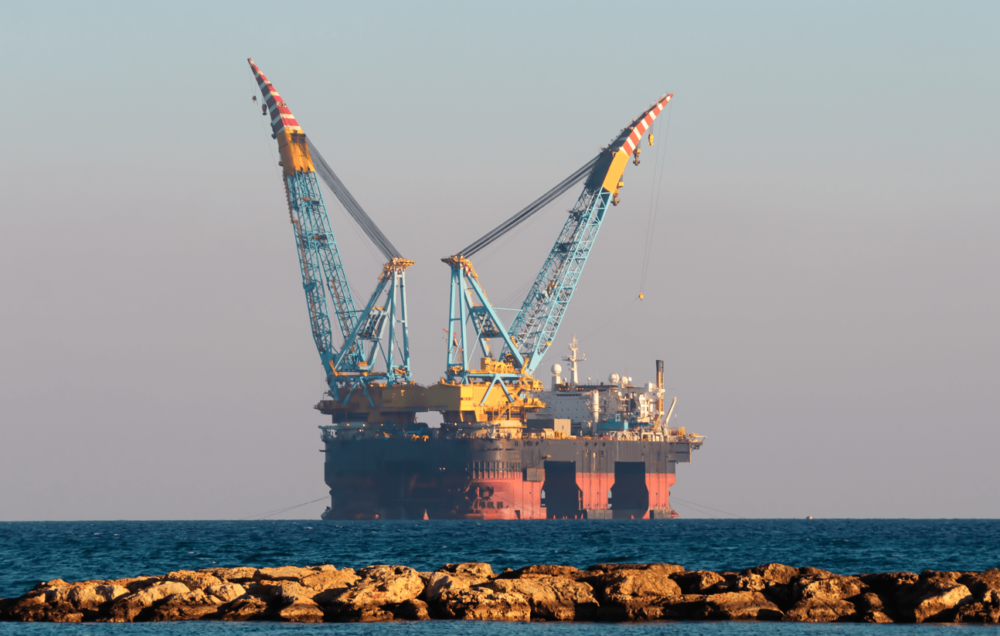
Gas and oil platform off the coast of Cyprus
Elections for the European Parliament
The European Parliament has six Cypriot members. Figures show that during the last EP elections in 2019, approximately 45% of eligible voters in Cyprus voted, compared to an EU average of 51%. An outlier in turnout was in 2004 with 72.50%; that year, Cypriots could vote for EP members for the first time. The gender distribution of elected MEPs in 2019 is striking. The average distribution in the EU that year was 59% male to 41% female, but for Cyprus, it was 100% male. The full overview of the 2019 elections is shown below:
| Party | Amount of votes in % | Seats | Political fraction |
| DISY – Democratic Rally | 29,02 | 2 | EPP |
| ΑΚΕL – Progressive Party of Working People | 27,49 | 2 | GUE/NGL |
| DIKO – Democratic Party | 13,8 | 1 | S&D |
| EDEK – Movement for Social Democrats | 10,58 | 1 | S&D |
| ELAM – National Popular Front | 8,25 | 0 | – |
| DIPA – Democratic Alignment | 3,8 | 0 | – |
| Symmaxia-Ecologist – Citizens Alliance-Movement of Ecologist | 3,29 | 0 | – |
| Other parties | 3,77 | 0 | – |
The Spring Eurobarometer of 2023 shows that about half of the Cypriots are interested in the upcoming parliamentary elections. Cypriots are above average satisfied with free and fair elections and freedom of speech. A large portion of Cypriots believe that EU actions have a significant impact on their lives – 87% compared to an EU average of 71%. Regarding EU migration policy, a large part – 72% – is dissatisfied, compared to an EU average of 50%. Issues that Cypriots believe should be addressed include poverty and social exclusion, public health, migration, and asylum, as well as stimulating the economy and creating new jobs. These issues are likely on the minds of Cypriots as they head to the ballot box in June.
Corruption
Satisfaction among the population regarding the tackling of corruption is low. According to the Spring Eurobarometer, 94% believe that corruption is widespread in the country, compared to an EU average of 68%. This perception was largely fueled by the issuance of EU citizenship through so-called ‘golden passports’ to wealthy non-EU citizens, many of whom are Russian. This issue is also addressed in a report by the Council of Europe focusing on corruption in Cyprus. The report highlights corruption among high-level executives and law enforcement officials. It calls for improvements in accountability and responsibility within the government to limit undue influence.
Additionally, ‘Cyprus Confidential,’ an investigation into more than 3.6 million leaked documents from six financial service providers, caused uproar. The investigation, led amongst others, by the International Consortium of Investigative Journalists (ICIJ), revealed that 67 out of 105 Russian billionaires on the Forbes World’s Billionaires List of 2023 used financial services in Cyprus to hide their wealth and evade Western sanctions. This sparked significant criticism in the European Parliament, where even sanctions against Cyprus were proposed. Member of the European Parliament Sophie in ‘t Veld criticized that the wrongdoings were exposed by journalists rather than authorities and referred to the EU as a ‘gangsters’ paradise.’
All in all, Cyprus has a tumultuous history, the consequences of which are still palpable. In a climate marked by political tension, Greek Cypriots will head to the polls in June. The need for resolution of the island’s political division remains a top priority in Cyprus and continues to play a role within the EU. Regrettably, despite hopes that were raised during the Republic of Cyprus’s accession to the EU, meaningful progress toward a lasting solution has yet to be made.
Julia is studying Notarial Law at Utrecht University. She is also studying Liberal Arts and Sciences, majoring in International Relations in Historical Perspective.
Images: Shuterstock

